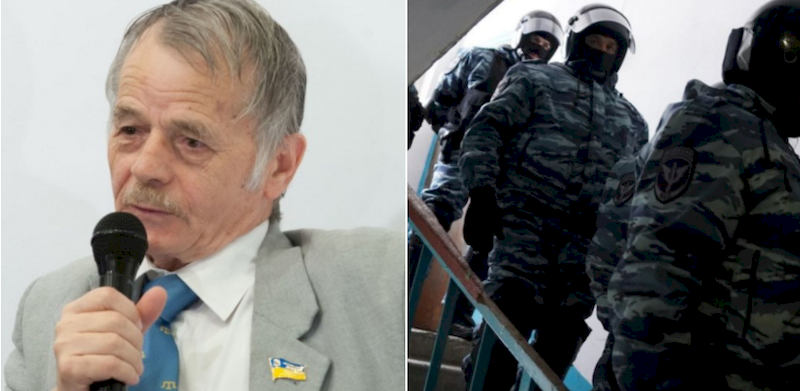• Topics / Human Rights Abuses in Russian-occupied Crimea
Mustafa Dzhemilev: Russian methods of repression in Crimea worse than Soviet times

Mustafa Dzhemilev says that the armed searches that Russia’s FSB carry out now in occupied Crimea are far worse than those of their Soviet predecessors. This is not the first time that the veteran Crimean Tatar leader who spent 15 years in the Soviet political labour camps, has pointed to a level of lawlessness under Russian occupation which goes beyond that of the Soviet totalitarian regime.
At a recent press briefing, Dzhemilev explained that in Soviet times, there were searches too, however there was certain procedure which was followed. A court warrant would be produced and the people would be told that the search was because of information that they had ‘anti-Soviet literature’.
Under Russia’s illegal occupation of Crimea, there are very often no warrants. Armed men in masks surround a building and then burst in, forcing people to the floor with their hands behind their backs and proceeding to turn everything upside down. They claim to be searching for weapons or banned literature, though Dzhemilev says that the FSB often have no idea themselves what it is that they’re looking for.
They take whatever they don’t understand, he says. If it’s not in Russian, for example, they’ll take it away, as well as the contents of the person’s computers. There have also been cases where money was stolen during such visitations.
In fact, the situation is often even worse than Dzhemliev described, with the armed men who turn up bearing no insignia to identify them. Given the number of abductions and enforced disappearances of Crimean Tatars and civic activists, it is no wonder that rights lawyers have begun warning Crimean Tatars to be vigilant when they hear of such ‘anonymous’ searches. The men who turned up at the home of Renat Paralamov and his family were not in uniform, and the two men who had FSB insignia on their clothes tried to hide it when a large number of neighbours and friends arrived.
Paralamov was taken away and savagely tortured before being dumped at a bus station the following day.
Unlike in Soviet times, where it was opposition to the regime that drew the KGB’s attention, now in Crimea any Crimean Tatar can feel at risk of such treatment. Such overt terrorization of the population is almost certainly the objective behind many of the armed searches.
Such tactics began within months of Russia’s invasion and annexation of Crimea, with Crimean Tatar homes, mosques and even madrasas (religious educational institutions) being targeted.
The arrests of people on politically motivated charges or for their faith began in January 2015, and have ever since been accompanied by such armed searches, often carried out with gratuitous violence in homes where children had been fast asleep.
All searches tend to begin very early in the morning, with whole areas sometimes cordoned off. Since effectively anybody could be targeted, the uncertainty when men are taken away must be agonizing. Will they be released, or end up, as have many indefinitely imprisoned and facing grotesque ‘terrorism’ charges over alleged and unproven involvement in the Hizb ut-Tahrir party which is legal in Ukraine and in no way ‘terrorist’?
Methods of intimidation, including unwarranted administrative fines and imprisonment imposed by Russian-controlled courts, increased sharply in 2017 with those circulating information about the latest searches or simply standing nearby in solidarity, themselves targeted.
Although Soviet prisons and labour camps were notorious for their lawlessness, Mustafa Dzhemilev believes that the conditions for political prisoners held in occupied Crimea are even worse. In Soviet times, they seldom directly used torture against dissidents, mainly because of the likely publicity., though they would find less open methods for making their lives in the camps intolerable. Dzhemilev says that he has spoken with prisoners held in the SIZO [remand prison] in Simferopol who tell him that everything is more brutal and lawless now. As reported, the very conditions in this SIZO are bad enough to constitute torture, and the occupation regime is currently holding two political prisoners – Bekir Degermendzhy and Asan Chapukh - in conditions which may be putting their very lives in danger.
As mentioned, Mustafa Dzhemilev began warning the world that the Russian occupation regime was at least more lawless than its Soviet predecessor very early on. In March 2015, he told the UN Security Council that people are afraid to speak with others, with fear ruling their lives in Russian-occupied Crimea.
Russia had failed to find a figure like Ramsan Kadyrov, Russian President Vladimir Putin’s protégé in Chechnya, among the Crimean Tatars, Dzhemlev said, and had turned to repression instead.
It has continued in this vein, with the deterioration of all rights which Mustafa Dzhemilev reported back in 2015 now even more extreme.
Perhaps the only positive development over the last year or so has been that the UN General Assembly, the OSCE and European institutions have stopped hiding behind circumspect euphemisms. They all speak unequivocally of Russia’s illegal occupation of Crimea and of flagrant human rights violations. The International Criminal Court’s Chief Prosecutor has clearly stated that Russia’s occupation of Crimea is to be viewed as an international armed conflict (falling under its jurisdiction). The UN International Court of Justice not only accepted Ukraine’s claim against Russia over its discrimination of Crimean Tatars and ethnic Ukrainians, but also imposed provisional measures against such discrimination.
All of this is important, but more is undoubtedly needed to stop the ever-mounting spiral of repression and terror under Russian occupation.





